ISLAMABAD, April 14 : China-Pak universities to establish intercropping technology research center, according to a report published by China Economic Net (CEN).
The center is going to be established in the Islamia University of Bahawalpur (IUB). It is planned to be affiliated with the key laboratory of China’s Ministry of Agriculture undertaken by Sichuan Agricultural University (SAU).
There’s excellent potential to develop intercropping technologies in Pakistan. Now, maize-soybean strip intercropping technology, developed by Professor Yang Wenyu from Sichuan Agricultural University, is flouring across Pakistan. “Maize-soybean intercropping technology which has been perfected in China can create immense benefits.
The report added, We can adopt, modify and update that technology for Pakistan to overcome our national requirements of edible oil and provide livestock better food supplies.
In addition, because Pakistan is blessed with a large amount of sunlight and other natural resources, it is very much likely to apply this technology to other crops as well,” Professor Athar Mehboob, Vice Chancellor of the Islamia University of Bahawalpur, talked about the feasibility of promoting intercropping in Pakistan.
“It is a field of agriculture, and within agriculture it’s a multi-disciplinary area. Therefore, the Islamia University of Bahawalpur has decided to establish a dedicated center for intercropping technologies, which can be adapted to Pakistan’s scenario and show better result in Pakistan.
We are looking forward to the assistance from universities in China particularly from Sichuan Agricultural University,” said Athar Mehboob when it comes to the decision of setting up the intercropping technology center.
“We are in the process of executing a memorandum of understanding (MOU) with Sichuan Agricultural University,” Athar Mehboob told China Economic Net. According to the MOU, 20 Pakistani students from IUB will get full scholarships from SAU to pursue PhD.
Athar Mehboob is in great expectation of cooperating with Chinese universities on student and faculty exchanges, scientific research and technology transfer.
“We take Chinese people as a model of great development who put their energies together in the past 20 to 25 years to transform their economy to be the one of the largest in the world.
The Chinese people enjoy peace, and the prosperity brought by the development is a model that is based on sharing. There’re many good values which we can learn from the Chinese people like the value of hard work, unity and sharing, etc.
So the exchanges between Pakistani and Chinese universities will further these shared values,” Athar Mehboob said. In the coming month, China and Pakistan will ring in the 70th anniversary of their diplomatic ties.
Going forward, “we would like to make it possible for the transfer of Chinese technologies in various fields like engineering, computing, physics and material sciences. Pakistan, with a population of 220 million, is a big market.
The various institutes of IUB can contribute to the development of the technologies which have been developed in China and take some of them for commercialization.
In the region where IUB located in, a lot of industrialization is about to happen in the future,” Athar Mehboob said with promising vision.

















